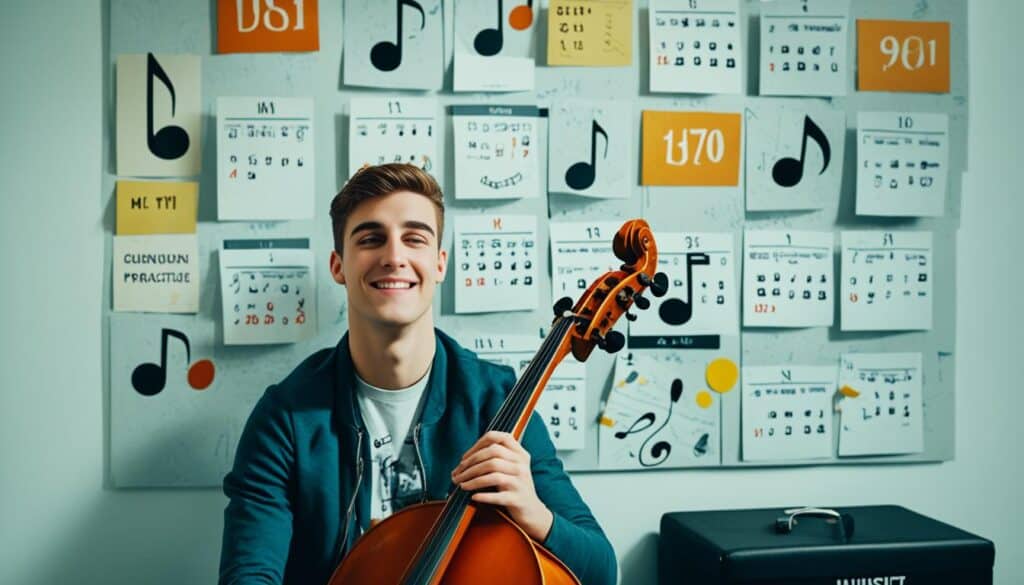Have you ever thought about how a secret melody might help with math? Or if a simple scale could lead to academic success? It seems blending music education with regular learning is working wonders in schools. This approach is getting a lot of attention everywhere.
My journey through classrooms has been filled with success stories. Not just for future musicians, but for budding mathematicians too. Join me as we look into how music and math work together. We will see how this mix is helping kids reach their full potential.
Key Takeaways:
- Involvement in music links to higher proficiency in mathematics, especially by grade 12.
- Schools featuring music programs boast significantly higher graduation rates.
- Music education may be a common thread amongst top academic achievers.
- Participation in music is associated with less substance use among teens.
- The educational benefits of music encompass improved literacy, creativity, and social skills.
- Access to music education still varies widely, demonstrating a need for increased advocacy and support.
Understanding the Rich Tapestry of Music Education
As I explore the basics of music education, it’s clear that the West’s rhythm is unique. But, in the United States, we think in terms of sound, melody, and rhythm. Yet, not everyone around the world thinks the same way about music.
Think about this: We usually keep music vocabulary to classrooms and books. But, I’ve seen tweens talk about music terms better than I remember my own birthday! When we include music in children’s lives, we’re not just teaching them notes. We’re inviting them into a world full of traditions and stories.
- The foundation of music discipline isn’t just about getting notes right. It’s also about understanding the stories behind those notes.
- According to the National Endowment for the Arts, more women are earning Bachelor’s in arts. But, they are fewer in music degrees, just 45% compared to 56%.
- High school students often see jazz as a boys’ club. Yet, Camille Thurman broke through, performing with the Lincoln Centre Orchestra. She broke a 30-year trend!
- Parents usually choose instruments based on gender—flutes or violins for girls, trumpets or drums for boys. But really, should instruments have a gender?
Music in children’s lives is much more than a lesson. It’s key in rehabilitation and brain health. For example, music therapy has shown a 25% improvement in some recovery cases. People with multiple sclerosis have seen up to a 40% better functional recovery. They also experienced 20% neuroplastic changes.
Early blind adults have better pitch perception thanks to music. Music affects our brains, specifically the anterior cingulate cortex. This part of our brain plays a big role in how we feel and think. Even patients in vegetative states respond differently to music, showing more activity than expected.
So, what should we learn from this? Music education is crucial for tweens. It’s like giving them a VIP pass to understanding life better.
Music Education for Tweens: A Developmental Powerhouse
Who knew jamming out could be so good for the brain? The impact of music on child development is huge. It’s like winning big in the brain game. Getting into music can work wonders for tweens. And it’s not just about being a star like Mozart or Beyoncé.
Imagine if algebra was easy. For tweens in music, it sort of is. They get better at math by playing instruments. Playing the piano can secretly help with math tests. Strumming a guitar or playing piano also helps tweens get along better with others. It makes them smarter and more social.
The benefits of music for tweens aren’t just academic. It helps them make friends and speak up confidently. They become quick thinkers and good talkers. Music helps tweens understand their feelings better. They learn to express themselves beyond emojis.
- Language skills? Yes.
- Reading better? Yes.
- Creativity that spices up science class? Absolutely.
Music turns tweens into little masters of their world. They face every challenge like a star. Let’s celebrate music education. It’s a big deal in growing up. Who’s ready to lead the learning orchestra?
The Cognitive Symphony: Benefits of Music Learning
Have you ever played a piano or guitar and felt your brain light up? That tingle might be your neurons celebrating. Musical training really does improve our brain development.
Here’s some fun facts. Music students have big vocabularies and read better than those who don’t study music. They even outshine peers in attendance, with a 93.3% rate. Music helps with language skills, spelling, and reading, no matter where you live.
Report cards show music students excel in math and English, with scores bumping up 17% and 19%. The cognitive benefits of musical education rival even algebra’s power.
Teachers and parents are pushing for more music classes. They believe cutting music funding hurts student growth. Music isn’t just nice to have, it’s needed for memory and solving problems.
- 93.3% attendance rates in schools with music programs? Coincidence? I think not.
- Three is the magic number of years for most in-school music education, but hey, more would be music to everyone’s ears.
- No instruments, no party—access to musical tools is essential, folks.
A study funded by the Brain and Creativity Research Funds shows music speeds up brain development. Young musicians, especially from tough backgrounds, gain faster language and reading skills.
As I practice my guitar, I’m not just learning notes. I’m training my brain like it’s at the gym. Let’s ensure every child can write their own cognitive symphony.
Choosing the Right Instrument: Discovering Your Tween’s Musical Affinity
Exploring the world of selecting musical instruments for children is exciting. Like finding the perfect note on a huge keyboard of choices. Knowing what your tween loves in music can be tricky but fun. It’s a bit like solving a mystery lollipop’s flavor with patience and listening.
Think of rock music as a powerful teacher. It helps teens learn about who they are. For parents dreaming of their rock star days, remember, it’s about your kids’ passions. Do they pretend to play guitar to Led Zeppelin or violin to Vivaldi? Understanding these signs helps find their music affinity discovery journey.
Tossing your child into complex music too early isn’t wise. Studies say to start lessons around when kids start school. They can pay attention better than during a quick snack. This delay helps their personalities and small hands get ready for music.
- If your child’s hands aren’t ready for complex instruments, start simple. Drums and piano are great for rhythm and music basics.
- Wait on wind and brass instruments until kids have their adult teeth. This protects their smiles.
- At about six years old, when their hands fit small string instruments, it’s time. Your home might feel like a mini orchestra is forming.
For parents who love a schedule, regular practice is key. Think of it as vital as brushing teeth. Fifteen to thirty minutes of practice, five days a week, helps kids improve.
Every tween has their unique music style. As you foster their musical interests, be their cheerleader, not just a strict instructor. Let them play music with friends or join a band. This boosts their confidence and teaches teamwork. Plus, jamming together is fun!
So, parents, turn up the music and enjoy this journey of selecting musical instruments for children. Soon, you’ll enjoy their performances, whether rocking out or enjoying a moving tune. Keep the music alive!
Music’s Social Beat: Collaborative Learning and Group Dynamics
Imagine a group of tweens making music together. At first, it’s all chaos. But soon, they find harmony. Music social interaction teaches them to connect. It’s like learning to be friends while playing. They learn to work together, just like in a tiny company.
Singing for just 30 minutes boosts your happiness hormone. This is true for everyone. Even heart surgery patients feel better with music. It’s like medicine that cheers you up.
Playing instruments and singing together does more than entertain. Group dynamics in music education make kids kinder and more understanding. A musical game once a week makes kids nicer. They learn to care for others more than before.
Music helps bond with family and friends. It brings people closer, like a perfect meal does. Through music, strangers can feel like old pals.
Music education faced tough times. In recent years, many programs were cut. But, there’s hope. Studies are showing why it’s important to keep music in schools.
- The “Sounds of Learning” project highlights music’s benefits in school.
- Big names like the International Foundation for Music Research are involved.
- From 2005 to 2007, they’re gathering info on how music improves skills.
Music education does more than discover stars. It prepares kids for life. They become smarter, more focused, and great team players. And, music makes learning other subjects more fun.
Music classes are shaping leaders of tomorrow. It’s not just about the music. It’s about building confident, smart, and brave individuals. Let’s make sure music stays in our schools. Every kid should have a chance to play in the world’s symphony.
Practice Makes Perfect: Encouraging Regular Music Engagement
I often think about fitting music practice into my tween’s busy life. It’s like a domino effect. Start it, and everything else falls into place nicely.
Why is sticking to music practice important? A simple G major scale can quickly boost language skills. We’re building a habit that leads to many good outcomes.
- Music boosts kids’ vocabularies faster than a quick bunny. It really helps their language skills grow.
- It improves memory too. Catchy tunes help kids remember things which help in school.
- Playing music together teaches teamwork. It builds friendships during jam sessions.
- Music introduces cultures from around the world. It teaches kids about different places while they have fun.
Playing music also sharpens hand-eye coordination. It’s not just for sports. It comes from switching chords quickly.
Music is like a brain workout. It boosts self-esteem and helps kids relax after tough homework. It’s a fun activity with many benefits.
- It can help with depression or anxiety.
- It makes kids more understanding and emotionally aware.
- Music supports mental health in many ways. It’s really helpful.
When my tween leaves to play music, I know it’s more than just a tune. Music is a powerful activity. It helps kids grow smarter, more skilled, and kinder. It prepares them for big moments in life.
Regular music practice isn’t just about the music. It gets them ready for life’s big moments. And those moments of kindness and self-control are truly rewarding.
Conclusion
Looking back, I see music education did more than teach me to play an instrument. It prepared me for a life filled with smart thinking and deep feelings. Studies show that music learning boosts language, memory, and even math skills. That’s a lot of benefits from learning musical scales!
The real story isn’t just in numbers. Take Katy O’Grady from Fairfax, for example. She motivated her son to keep playing the trumpet with a little bribe. Many adults wish they hadn’t given up on music. I know I’d give anything for one more band session in school. Music teachers like Rebecca Carey and Alyson Schafer know that being flexible and honest can spark passion in teens. Sometimes, changing the music style can rekindle their love for it.
Taking a short break from music can bring the joy back without the stress. This break can turn a dusty instrument into a source of lifelong happiness. The way we learn music is getting better with things like The Lincoln Center Pop-Up Classroom and Big Ear Games. As music becomes a bigger part of school, every tween will soon be making their own tunes in life’s big song.



